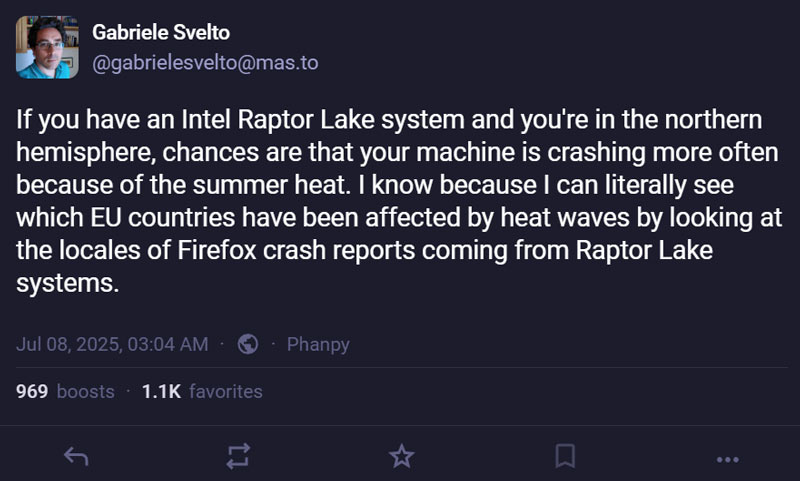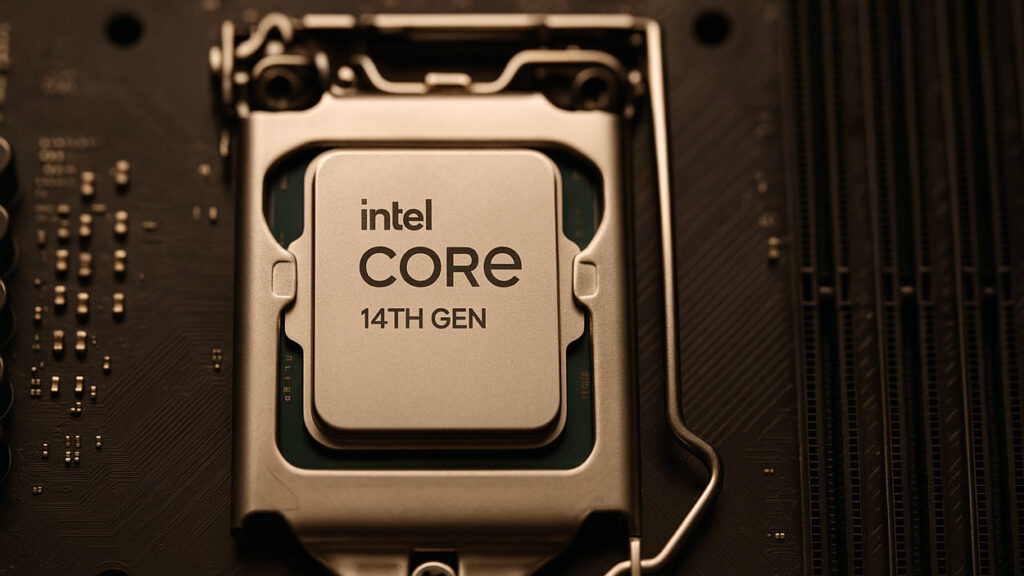Firefox crash logs show Intel’s 13th and 14th generation Raptor Lake desktop processors are crashing more often in Europe during this summer’s heatwaves, exposing persistent hardware instability issues worsened by ambient temperature.
TLDR:
- Firefox engineer Gabriele Svelto observed sharp rises in Raptor Lake related browser crashes that directly track European heatwave zones.
- These issues trace back to voltage timing flaws and silicon degradation in the chips, something Intel calls “Vmin Shift Instability”.
- Intel’s microcode fixes (0x125, 0x129, 0x12B, 0x12F) offer partial relief but can worsen incidents under certain conditions.
- Intel extended warranties to five years, but experts warn that heat may accelerate degradation beyond patchable limits.
A Calculated Crash
Have you noticed your browser crashing more during this heatwave? You’re not alone. Gabriele Svelto, a senior platform engineer at Mozilla, revealed a striking correlation: Firefox crashes on machines with Intel Raptor Lake CPUs cluster around the hottest areas in Europe. These are browser crashes, not full system lockups, but they are frequent enough that Mozilla had to disable an automated crash reporting bot, since the system was overwhelmed by Raptor Lake error logs. The most affected CPU seems to be the Core i7 14700K, a mainstream desktop chip now showing up disproportionately in failure reports. Europe’s recent heatwave, with daily highs over 40 °C in many regions, has pushed these processors beyond their tolerance threshold.

Why the Chips Can’t Take the Heat
The root of the problem lies in a defect known as Vmin Shift Instability. It stems from erratic voltage regulation and timing behavior in the CPU’s circuitry, issues Intel first confirmed in July 2024. Running at elevated voltages makes the chips degrade faster. That degradation becomes more serious under heat, since high ambient temperature further reduces timing margins. Intel deployed several firmware patches including 0x125, 0x129, 0x12B, and most recently 0x12F in May 2025 to curb these voltage spikes. According to Svelto, patch 0x12C and earlier versions eased many bugs, but the 0x12F update “made things worse” for heat exposed systems. Intel says the root cause remains unchanged despite the updates.
Partial Fixes vs Permanent Damage
Intel’s firmware updates can mitigate immediate instability but cannot reverse physical deterioration of the chips. That degradation, especially when aggravated by heat, may continue silently until it resurfaces later, which raises questions about long term reliability. When the defect became clear, Intel extended its warranty on affected desktop CPUs from three to five years. This gives impacted users a path to RMA, but what happens if the chip starts failing in year six or beyond? That remains the million dollar question.
CoinLaw’s Takeaway
I’m genuinely concerned. Intel’s Raptor Lake chips are under great strain right now, and heat is speeding their breakdown. Firmware patches are just band aids and may not protect against long term wear. If you own one of these systems, check for the latest BIOS updates, improve your cooling, and consider moving to a cooler environment or a more resilient CPU. Intel did the right thing extending warranties, but I’m worried warranty limits may not match real world lifespans in a warming climate.
